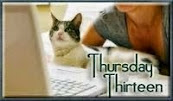I got up at about 8:00 AM. I decided to ease myself into the day by answering Bev's
Sunday Stealing questions. I didn't get very far. I lazily stretched and touched the back of my neck and ... uh-oh. A big, hard welt was under my fingers. Using my hand mirror, I checked it out in the bathroom mirror.
OH. MY. GOD! The welt was flame red. The welt was not only not red yesterday, it wasn't even there. It grew like this overnight.
Last Monday or Tuesday, I noticed a little something back there. Like a tiny scab. I'd gotten a haircut Saturday and thought maybe my stylist nicked me with the scissors. When it didn't go away, I started rubbing OTC hydrocortisone cream on it. And didn't give it any thought until this morning, when it had suddenly grown into a big, hard, red welt.
My body chemistry is a little weird. I'm very allergic to bee sting and carry an epipen with me at all times. When visiting Dallas decades ago, I got bit by an ant and my foot swelled, but it happened almost instantly. The lag time this time bothered me. I never felt a bug bite or sting me. Why is my body reacting at least 5 days after the fact?
Also, the back of my neck is near my spine and my brain. If for some reason blood poisoning is coursing through my system, I don't like the proximity.
So I tried to calm down. I took a shower. I fed the cats. I put extra food and extra water down, just in case I was going to be away for a while. Then I went to the ER.
I hear horror stories all the time about Emergency Rooms, how they're full of moaning and sick people, how long the wait times are. But that is not at all what I experienced. I got there at 10:00 and by 11:30, I was off to Walgreen's, prescription in hand.
As I suspected, it's an allergic reaction to a bug bite of some kind. The welt is my body's way of "circling the wagons" to contain the poison in one area. Since I didn't have a fever and my lymph nodes felt normal, the NP was confident that the allergic reaction had remained local. But she said I was wise to come in when I did. There is no guarantee that it wouldn't spread. She prescribed a corticosteroid and heat treatments.
I got home, applied the cream, ate a little leftover pizza, and fell asleep. For four hours. Being scared is exhausting!
I'm pissed that my Sunday is gone, but I'm also grateful.
• I live in a neighborhood where quality healthcare is minutes away.
• For Medicare and my Medicare supplement plan. No one talked to me about money at the hospital, and the prescription cream cost me $2.
• My friend John's example. He never went to the doctor until he was absolutely forced to. He was afraid of what he would hear. He died in April, and I will never believe this outcome couldn't have been avoided or forestalled. I'm not saying God took him as an example, because I'm sure God doesn't work that way. But I do believe I'm meant to learn from and avoid John's suffering.
• I'm likely going to be OK. If this redness and swelling haven't lessened by Wednesday, I'm supposed to contact my dermatologist. That doesn't sound too scary, does it?

































.jpg)




